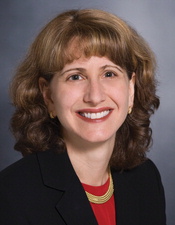 A little more than a month ago, Naomi Fried, chief innovation officer at Boston Children's Hospital, tweeted: that most healthcare mobile apps are built for consumers and focus on health and wellness, while only 20 percent are clinical apps. She wrote: "We need more #hospital apps." Naturally, this caught our attention.
A little more than a month ago, Naomi Fried, chief innovation officer at Boston Children's Hospital, tweeted: that most healthcare mobile apps are built for consumers and focus on health and wellness, while only 20 percent are clinical apps. She wrote: "We need more #hospital apps." Naturally, this caught our attention.
"There's a huge opportunity for mobile apps in the hospital environment," Fried told MobiHealthNews in an interview ahead of the annual Healthcare Information and Management Systems Society (HIMSS) conference. Fried will be receiving a HIT Men & Women Award at HIMSS in New Orleans this week for being an up-and-coming innovator.
"It's easy to build a consumer-facing app that doesn't connect to a hospital system," Fried says. However, she adds, "There is a great need in the hospital environment."
One reason why consumer apps have proliferated is that they tend to be easier to develop than professional apps. "I would also say that [medicine is] a complex environment to build in," Fried offers. Medical records are highly detailed, and healthcare has stricter privacy and security requirements than other fields. "There's a lot of nuance in the healthcare industry," she notes.
Fried has a message for entrepreneurs looking to get a piece of this $2.5 trillion industry: "Partner with someone who understands healthcare."
According to Fried, mobile apps can facilitate easy communication among clinicians, something that is badly needed as payers and other healthcare purchasers demand greater emphasis on a team approach to medicine and shine a light on continuity of care. Among healthcare professionals, "We're looking at leveraging the convenience, mobility and usability factors that come with most mobile apps," Fried says.
The Harvard Medical School-affiliated Boston Children's is taking on a lot of app development itself as it looks to meet the demands of its professional staff and patients alike.
Fried created the FastTrack Innovation in Technology (FIT) Awards for hospital in 2011. Winners get dedicated time with innovation developers to build a prototype and conduct a proof of concept. "This is targeted at software development," Fried said.
One winner, Dr. Deborah Weiner, a pediatric emergency physician at Boston Children's, created a mobile app for communications in the ED and a platform to help deliver laboratory values, diagnostic test results and other pertinent information back to doctors more quickly so they can make medical decisions earlier. A pilot of the app found that lab results came back 28 percent faster with the app than without it, according to Fried.
"We also recognize that mobile apps can help patients," Fried says.
Boston Children's currently is piloting another winning entry, an iPad app for admitted patients to access test results while still in the hospital. The app includes names and photos of each patient's care team so they know who will be treating them. Clinicians can deliver information and care plans to families of inpatient children so they know what will have to happen for a patient to be discharged.
Additionally, the innovation program advised on development of a wayfinding app to help patients and even staff negotiate the maze of the Boston Children's main campus, which comprises 12 interconnected buildings, 15,000 rooms and 3 million square feet of space.
Fried is starting to see some progress from others in meeting the demand for hospital apps. For example, the hospital has a Cerner electronic health record. The North Kansas City, Mo.-based vendor last year released its first-ever native iPad app for its EHR called PowerChart Touch, though Fried is waiting for an update later this year before adopting the mobile version.
"We're very early on in the adoption of clinical mobile apps and I think a few years from now we are going to see a very different landscape," Fried says.














